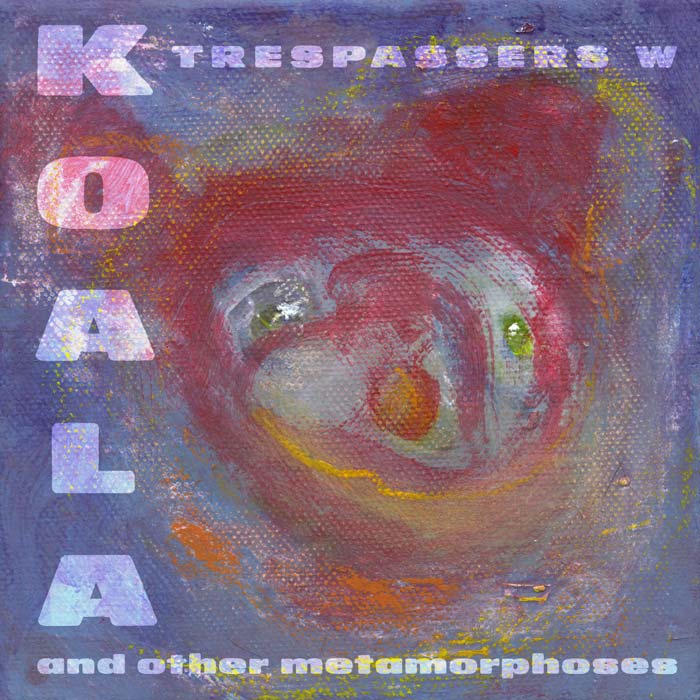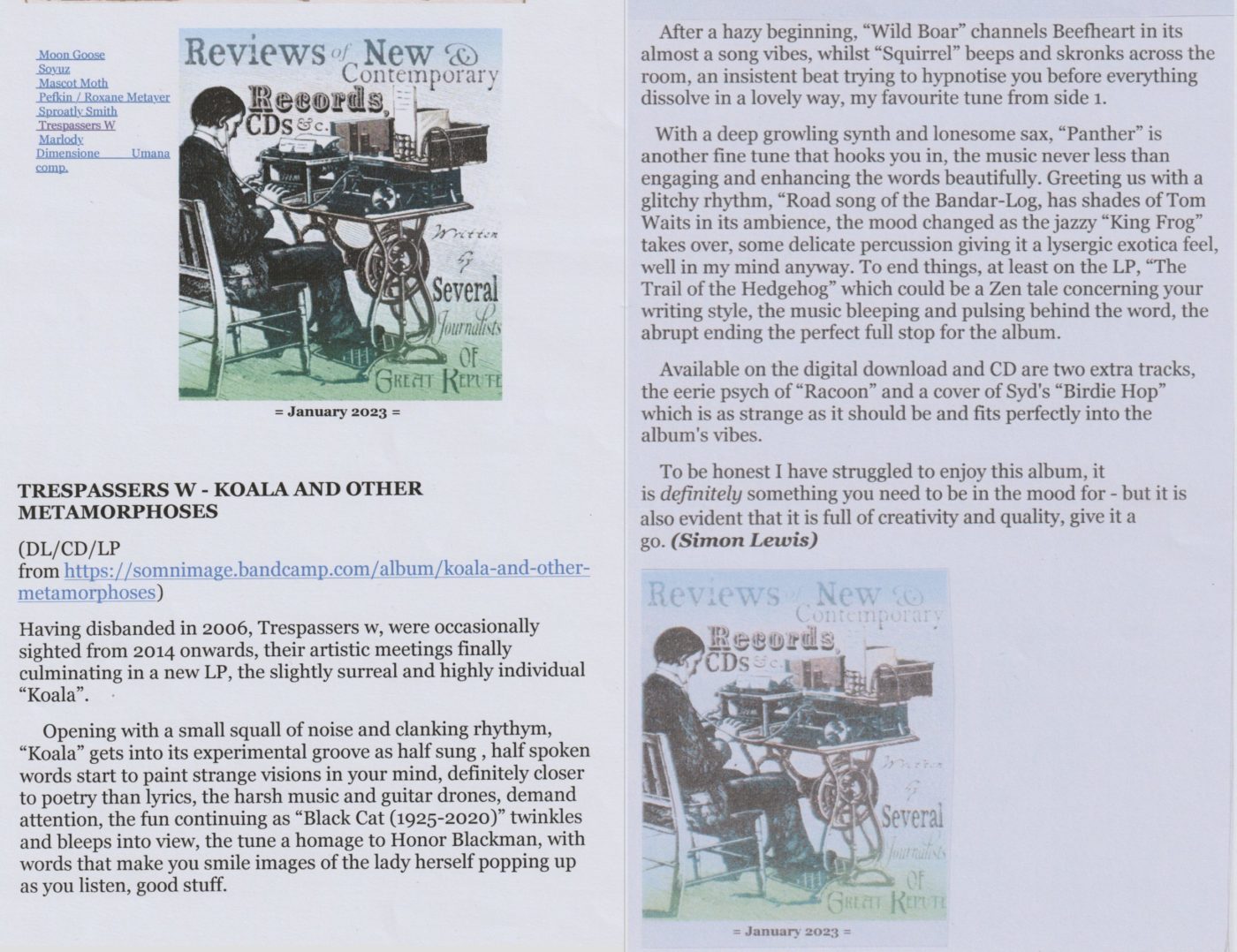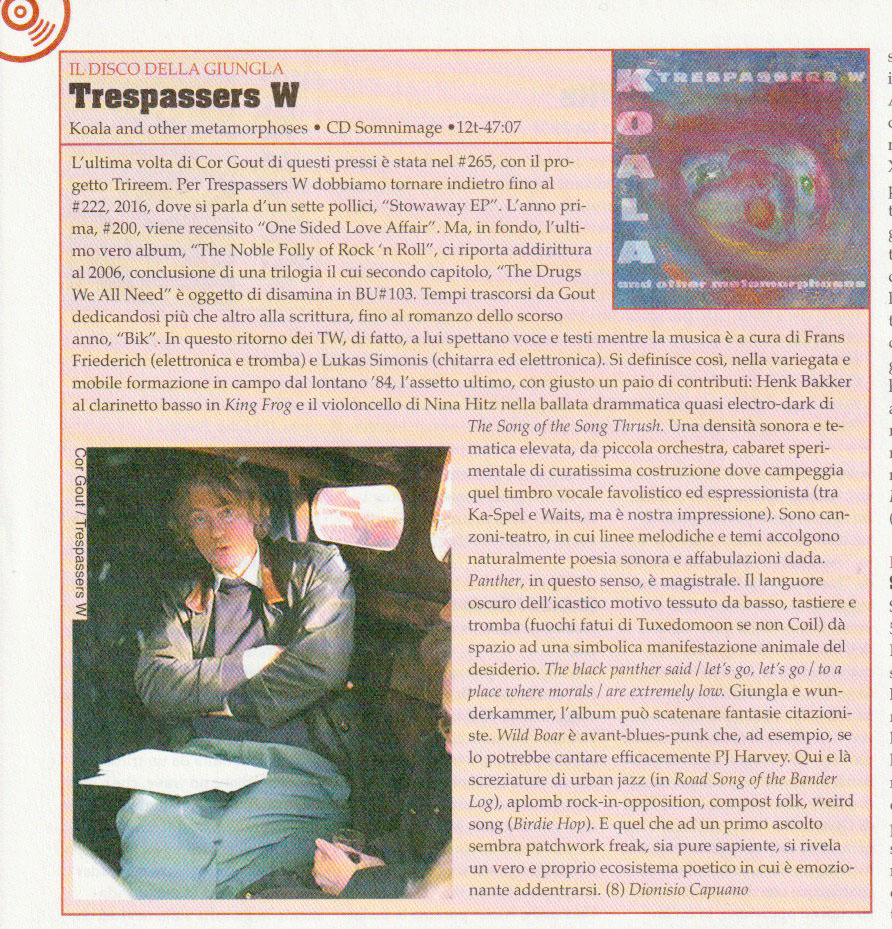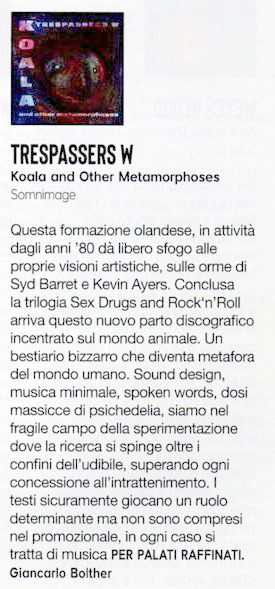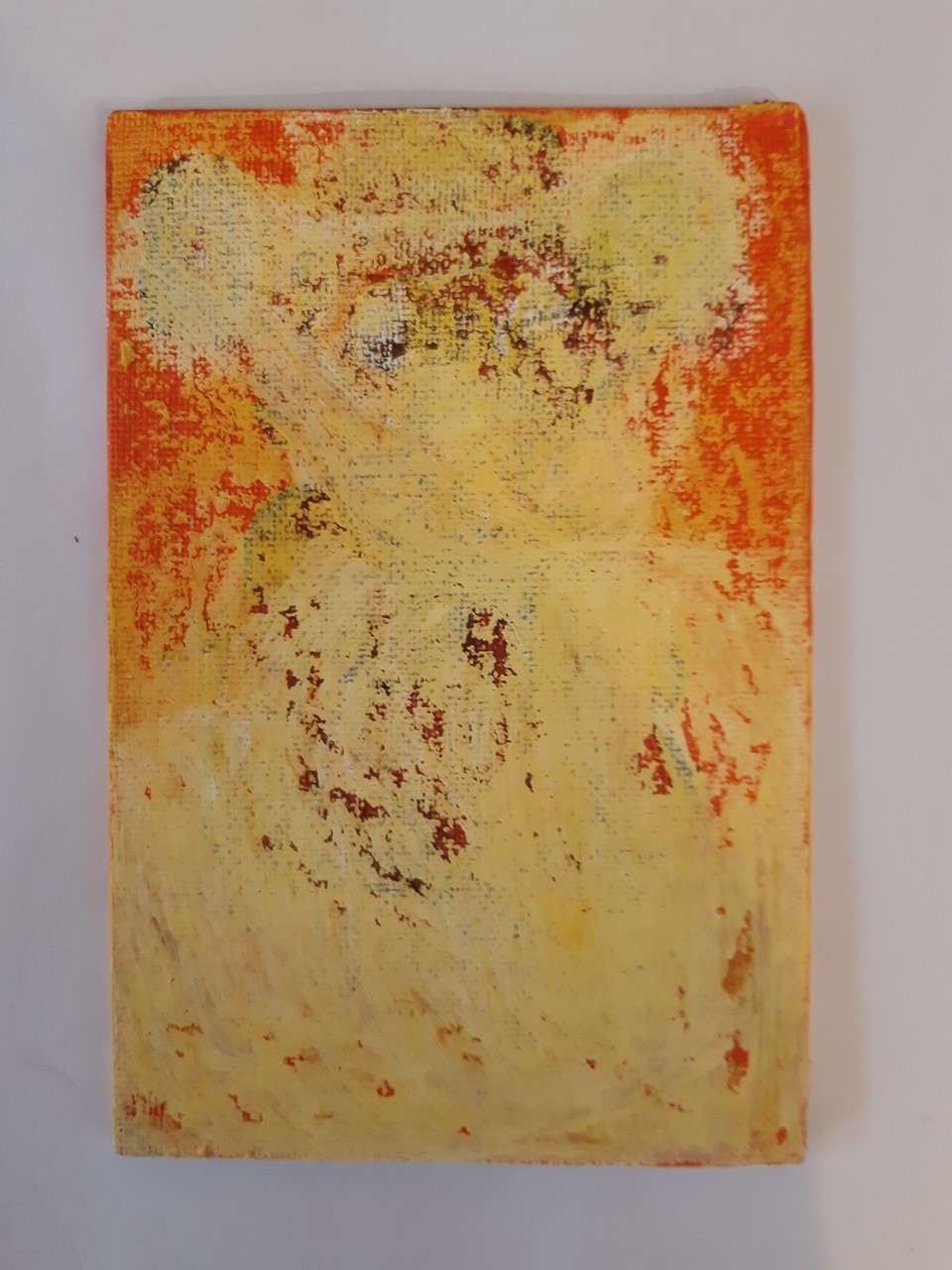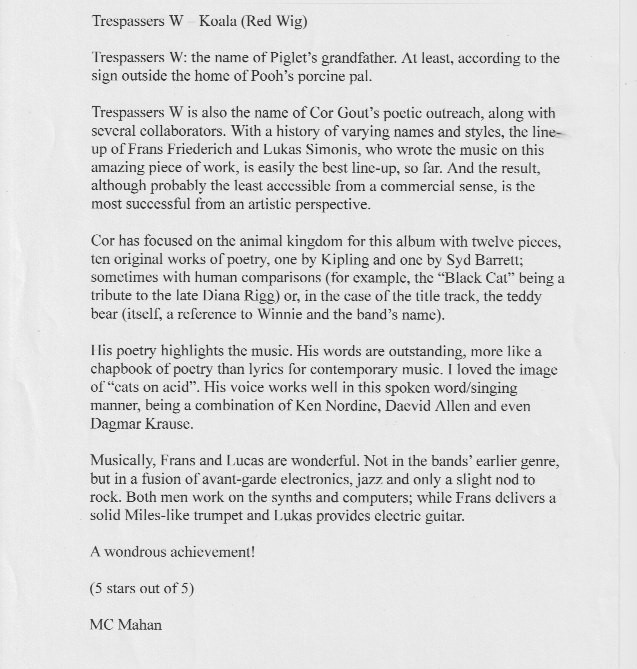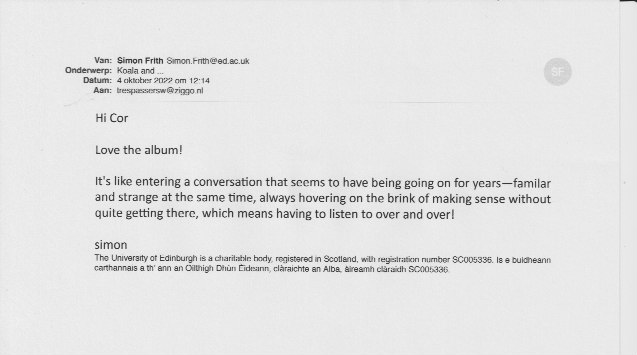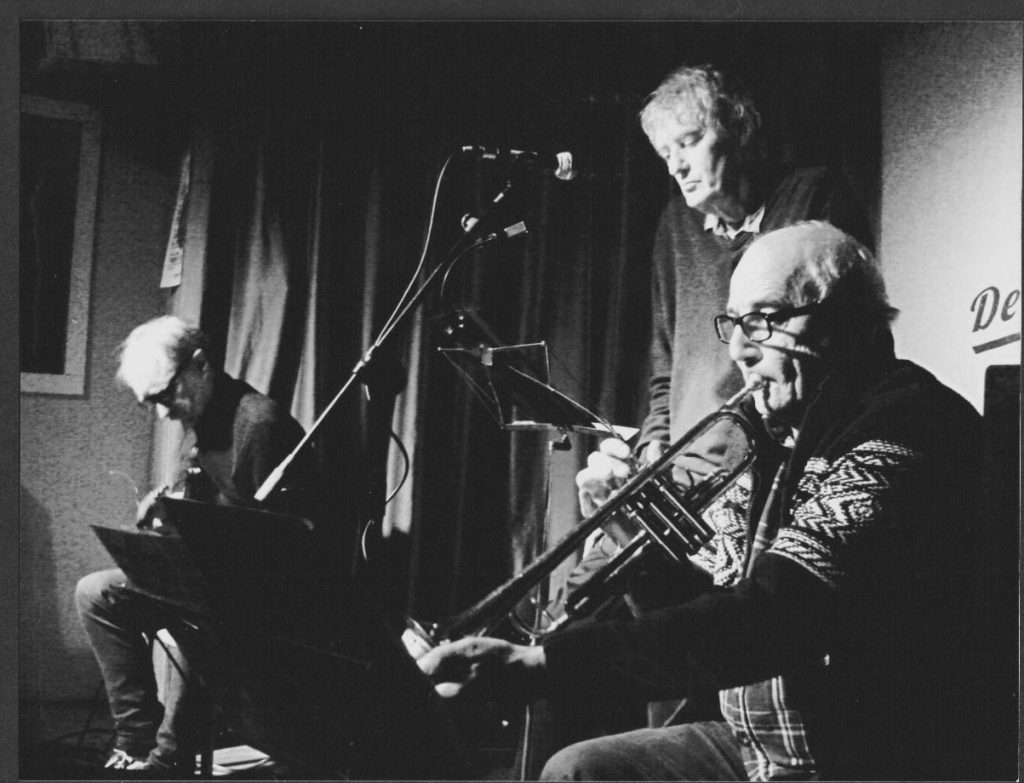This Dutch ensemble, active since the eighties, gives free rein to its artistic visions, in the footsteps of Syd Barrett and Kevin Ayers. After their “Sex Drugs and Rock’n’Roll” trilogy, they appear with this new discographic birth centered on the animal world. A bizarre bestiary that becomes a metaphor for the human world.
Sound design, minimal music, spoken words, massive doses of psychedelia, and all this in the fragile field of experimentation where research goes beyond the boundaries of the audible, surpassing any compromise on entertainment. The lyrics certainly play a decisive role, but they are not included in the promotional copy. In any case it is music FOR REFINED PALATES.
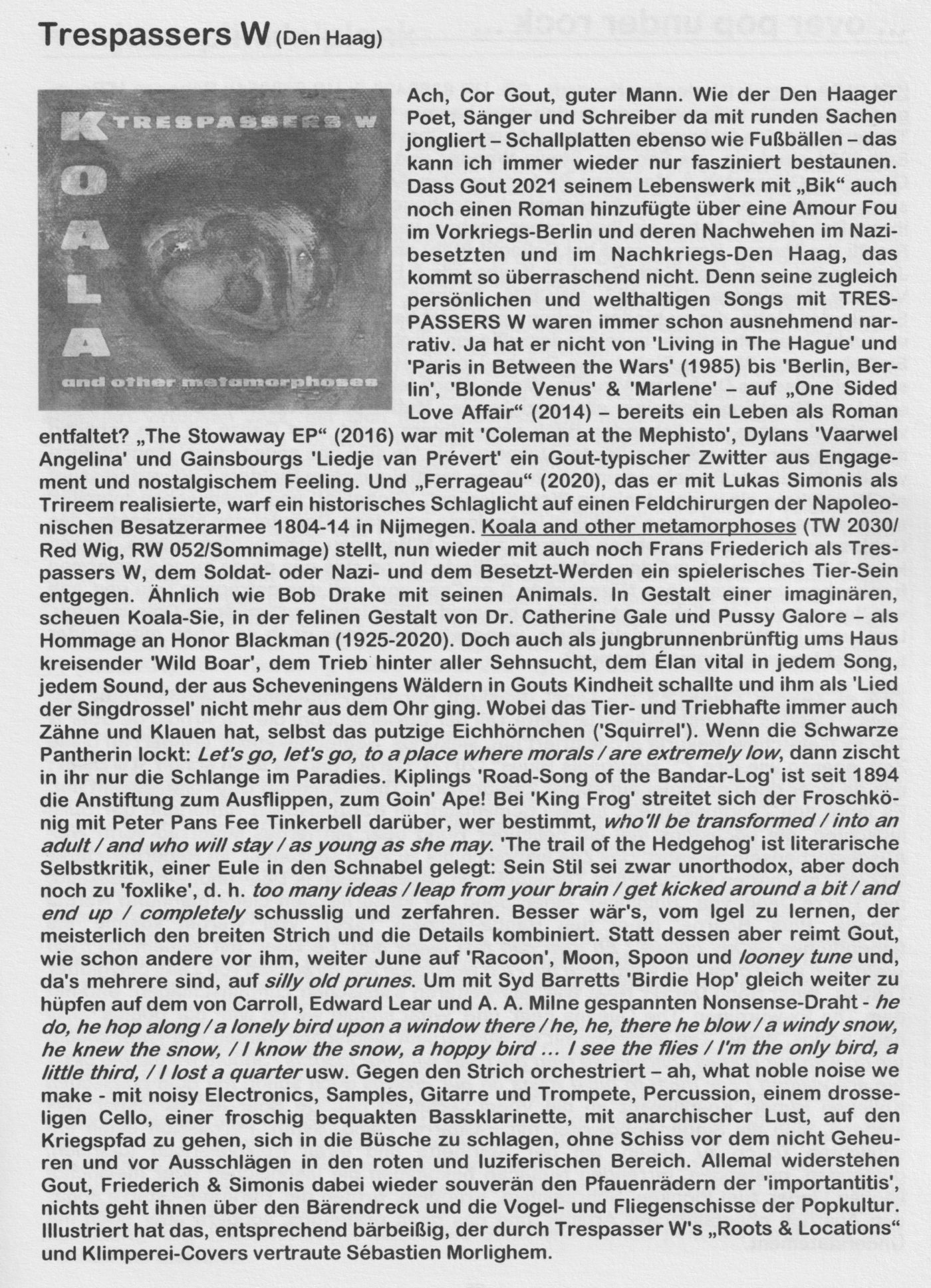
Review Koala in Blow-Up#202, September 2022
“Cor Gout’s last time on these pages was on issue 265 with the Trireem project. For Trespassers W we have to go back to issue 222, in 2016, where there is a review about a 7” EP called “Stowaway”. One year before, issue 200, there’s a review about “One Sided Love Affair”. The last real album “The Noble Folly of Rock’n’Roll”, takes us back to 2006, at the end of a trilogy whose second album “The Drugs We All Need” was the subject of analysis on issue 103. Times spent by Cor Gout dedicating himself mainly to writing, up to last’s year novel “Bik”.
In this return of TW he actually gets vocals and lyrics, while the music is mainly by Frans Friederich (electronics and trumpet) and Lukas Simonis (guitar and electronics). This is how, in the varied and mobile line-up active since 1984, the ultimate set-up is defined, together with Henk Bakker, bass clarinet on “Dr. King Frog” and Nina Hitz, cello on the nearly electro-dark dramatic ballad “The Song of the Song Thrush”. An intense sound and thematic density, like a small orchestra; a very well-finished experimental cabaret construction where that fabulous and expressionist vocal timbre of his (between Ka-Spel and Waits, according to our impression) stands out. These are theatre-songs, in which melodic lines welcome sound poetry and Dada storytelling. “Panther”, in this sense, is masterful. The dark languor of the iconic motif woven by bass, keyboards and trumpet (Tuxedomoon wisps or even Coil) gives way to a symbolic animal manifestation of desire. The black panther said/ let’s go let’s go/ to a place where morals/ are extremely low.
Jungle and Wunderkammer, this album could unleash citationistic (*) fantasies. “Wild bear” is avant-blues-punk effectively suitable for PJ Harvey. Urban jazz mottling here and there (in “Road Song of the Bender Log”), aplomb rock-in-opposition, compost folk, weird song (Birdie Hop). And what, at first glance, seems like a freak patchwork, albeit a wise one, turns out to be a real poetic ecosystem in which it is exciting to enter.”
(*) als zijn ze opgeroepen)
Dionosio Capuano
Translation:
Trespassers W, Koala and other metamorphoses lp/cd (Somnimage/Trespassers W/Red Wig)
This Dutch ensemble, active since the eighties, gives free rein to its artistic visions, in the footsteps of Syd Barrett and Kevin Ayers. After their “Sex Drugs and Rock’n’Roll” trilogy, they appear with this new discographic birth centered on the animal world. A bizarre bestiary that becomes a metaphor for the human world. Sound design, minimal music, spoken words, massive doses of psychedelia, and all this in the fragile field of experimentation where research goes beyond the boundaries of the audible, surpassing any compromise on entertainment. The lyrics certainly play a decisive role, but they are not included in the promotional copy. In any case it is music FOR REFINED PALATES.
(Giancarlo Bolther Rockerilla, february 2023)
Traduction:
Cette formation néerlandaise, active depuis les années 1980, laisse libre cours à ses visions artistiques dans la lignée de Syd Barret et Kevin Ayers. En conclusion de la trilogie Sex Drugs and Rock’n’Roll, voici un nouvel apport discographique centré sur le monde animal. Un bestiaire étrange qui devient une métaphore du monde humain. Conception sonore, musique minimale, slam, bonnes doses de psychédélisme, nous sommes dans le champ fragile de l’expérimentation où la recherche dépasse les frontières de l’audible, surmontant toute concession faite au divertissement. Les paroles jouent certainement un rôle déterminant mais ne sont pas incluses dans la promotion. Quoi qu’il en soit, il s’agit d’une musique POUR PALAIS RAFFINÉS.
Giancarlo Bolther
Review by Robin James
Fresh avant garde jazz storytelling, almost operatic in scope, upsetting and volatile. Dark, tedious, romantic, recounting and mystical, with morbid motifs sometimes bringing the audience into direct contact with the dangers of life. A physical expression in space that finds beauty in things others consider dark, conspicuously dark, antiquated and eerie, mysterious, complex and exotic with seductive depictions of shadowy extravagance that again and again hurl the spectator into the center of the action. These compositions offer a closer look at socially alienated monsters, and some characters that are gradually going insane, but they are also stunningly attractive. Some stories here are autobiographical and brooding, some are children’s stories, one by Rudyard Kipling and one by Syd Barret.
Sometimes evoking Celtic mythology, Christian mythology, Egyptian mythology, and various traditions of Paganism, with the title Koala my first thought was “oh koala, how cute!” Now I realize that the storyteller vocalist Cor Gout only assumes his new friend is a koala, but it is clearly something else, and probably very dangerous, “Koala” (3:52). Who is going to tell him? There is a potent connection to Edgar Allen Poe, the voice of the madman late at night confessing his frights, that is where “Black Cat” (4:21) starts, somehow vaguely invoking Poe and then it goes into new horrors and spectrums of evil. Like Poe this is intended to be disturbing and emotional art. The rock dirge “Wild Boar” (3:10) combines romance and dark elements to produce mystery, suspense, terror, horror and the supernatural, a mesmerizing gothic-rock masterpiece. Just stay away from the wild animals that will come for you in the strangest places.
“The Song of the Song Thrush” (4:17) is about the choir of nature, and how it looks from inside, birds are in the mix, within the horror din. In nature, the animals hunt and eat each other. This reaches into a point of view of the obscure, from a lush wilderness, speaking of sadness, nihilism, dark romanticism, tragedy, melancholy and morbidity, so elegant. The violin brings it home.
Just when track 5 seems like a stroll in the peaceful ambient wilderness, along comes the sledgehammer and the mood becomes dangerous in a new way, “Squirrel” (4:38) is an ode to the friendly frisky furry tree rabbits with big tails, which are actually toothy predators. Most of the track has an insistent beat with a message in poetic form, squirrels are there. Then a panther starts growling out there, is it getting closer? This song features the demise of the narrator again. “Panther” (4:44) is seductively starting over in the wilderness, so deep that the light fails, hiding ruinous castles, gloomy churchyards, claustrophobic monasteries, and lonely mountain roads. The story is possibly about mistaking ruthless authority for compassion.
The Bandar Log are the Monkey People, this tune offers some well placed levity which is always appreciated, the location is over the top, the chance meeting of these various fellows leads to this frustrating adventure, “Road Song of the Bandar Log” (3:52) featuring words by Rudyard Kipling.
Next, we find a story of the pond, with ducks and an elf. The ugly duckling is transformed but who can claim credit, the old king or the elf? “King Frog” (4:51) keeps the strange sounds in a rhythmic framework and adds a dimension where nature itself lurks as a malign protagonist. Night could be when the amphibians feel most free. “Peacock’s Deceit” (3:30) is about active romance and the sound of a surreal world that focuses on uncovering its own splendor, a wandering collage trying to survive. “The Trail of the Hedgehog” (2:48) combines the broad sweep and the detail, imagine dark nature, dark man, dark thoughts, tragic and accomplished with new technologies and the oldest emotions. The trail of the hedgehog leads to the artist’s search for perfection. How can the wanderer resist the discovery of left-over jelly on the spoon? “Racoon” (3:48) has the beats, it has the awesome distorted guitars and whatnot (some fabulous whatnot by the way) all done in a strange slow dark way.
Now for the finale, a Syd Barret song, “Birdie Hop” (3:16) which might be also about nature and survival, a brutal recital in the ethereal blues wave, killing on the hectochrome plane, and the flies that always persist in the end.
Koala’s assets are its liabilities, the experience is perfectly dark and painful, some of us like that. This is not an homage to Poe, it has a Poe fever dream horror quality, secrets are articulated, while space-jazz-funk is twittering and molting in the air. This is not a Goth revival, it is something very different, it is all dramatic and slow and with interesting instruments. I can’t stand it and I never want to hear it again but I probably will come to accept my personal enjoyment of this music because it constantly haunts my dreams now, and I mean that in a good way. You can have it both ways.
Here, the classical art traditions continue to shine, the oldest tragic theater craft is perfect in every way (gloomy and brooding), and perhaps the words themselves have special new possible meanings because of the pronunciation and intonation and context. The feeling is very compelling because it sounds familiar but in a new way, originating through the voice of someone from another land, from Holland.
For this album, Koala, TRESPASSERS W is a trio, two instrumentalists and a vocalist, Frans Friederich, Lukas Simons and Cor Gout. This is not for everybody, but it is a monumental work of fine art, and long live the strange emotional passions of Edgar Allen Poe! Poe worked mostly in text, today here and now we have our electronic phantom sounds as well as the old traditions of music and physical theater. It was once speculated that sometimes great art can leave you exhausted at the end because of the intense emotional workout.
(From the press release:) After 2006, when The Noble Folly of rock’n’roll saw the light of day, we all thought that this cd, volume three of the series Sex and Drugs and Rock’n’roll, was Trespassers W’s swansong. Individual members choose their own path and singer Cor Gout intensified his career as a writer of poetry, short stories, essays and (in 2021) a novel. Being the musician that he is, he surrounded some of his books with music: Muziek in zwart wit (Music in black and white) illustrated the interviews with Dutch jazz-musicians from the thirties, forties and fifties with songs, performed by John and Annelies van Markwijk, Ab Bol, former Trespassers W-drummer Peter Bos and Cor Gout, that had made these old jazz-celebrities famous. (the story continues) Since 2006 Trespassers W metamorphosed several times, but in these recreations the band never disappeared. On the contrary, it changed back into the elusive band it always has been.
Limited Edition LP – 300 Copies worldwide, also available as a Digital Album
Trespassers W – Koala and other metamorphoses
from: Igloo Magazine 7-12-22

